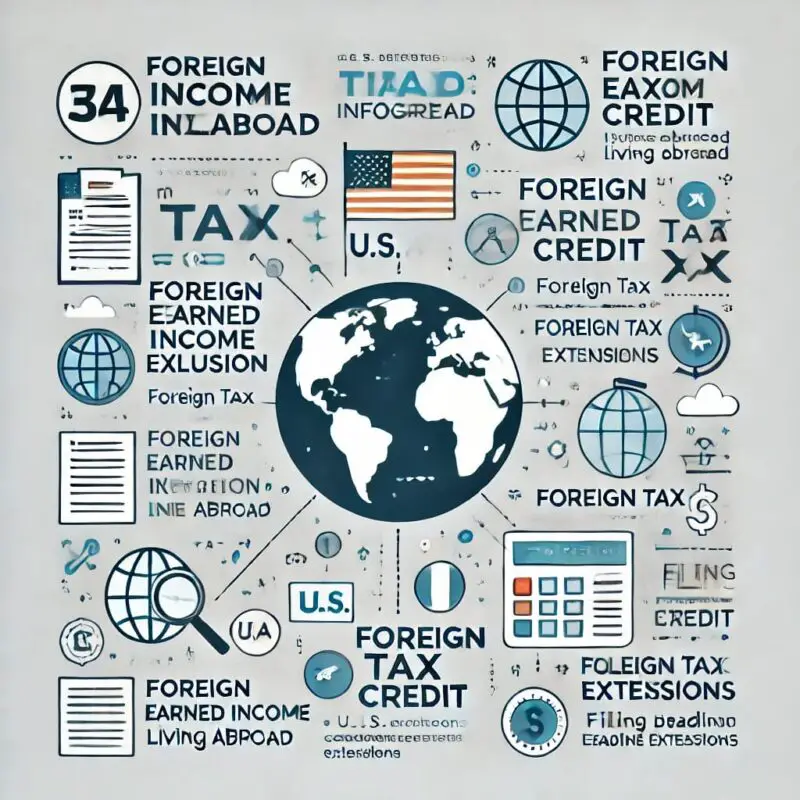
If you’re a U.S. citizen or permanent resident (green card holder) living outside the United States, one of the most common questions you may have is: “Do I need to file a tax return?” The short answer is: Yes, you must file a U.S. tax return annually, even if you live abroad. This may seem confusing to many, but it’s true according to U.S. Levy laws. Let’s break it down in detail.
Why Do U.S. Citizens Living Abroad Have to File a Tax Return?
The United States is one of the few countries that taxes its citizens and permanent residents on their worldwide income. This means that even if you live abroad and earn income from sources outside the U.S., you must report this income and file a Levy return with the IRS (Internal Revenue Service) each year.
The requirement applies whether you are living temporarily or permanently in another country. The U.S. government wants to ensure that citizens and residents pay taxes on their global earnings, even outside the country.
The Filing Requirement for Expats
U.S. citizens and permanent residents living abroad are generally required to file a Levy return if their income exceeds the IRS filing thresholds, which vary depending on your filing status (single, married, head of household, etc.) and age. For instance, for the Levyyear 2023, if you’re single and under 65, you must file a return if your gross income is at least $13,850. The threshold increases if you’re married or over the age of 65.
Even if your income falls below the threshold, you may still want to file a return to claim certain Levy benefits or refunds.
“Discover the best tax tips for 2025 to maximize your refund with this comprehensive guide from The Savvy Dollar.”
Exclusions and Credits for Expats
While the U.S. tax laws may seem burdensome, there are provisions designed to reduce the Levy burden for expatriates:
- Foreign Earned Income Exclusion (FEIE): One of the most beneficial Levy breaks for expats is the Foreign Earned Income Exclusion. This allows you to exclude up to $120,000 (for the 2023 Levy year) foreign earned income from U.S. taxes. To qualify for this exclusion, you must meet certain conditions, such as passing the “bona fide residence” test or the “physical presence” test.
- Foreign Levy Credit: If you pay a Levy to a foreign government, you may be eligible for the Foreign Levy Credit. This allows you to reduce your U.S. Levy liability by the amount of foreign taxes you’ve paid, helping to avoid double taxation.
- Foreign Housing Exclusion or Deduction: If you live in a foreign country and incur housing expenses that exceed a certain threshold, you may be eligible to exclude or deduct those expenses from your U.S. taxable income. This can significantly lower your Levy liability.
Filing Extensions for Expats
U.S. citizens living abroad are eligible for an automatic extension to file their Levy returns. You get another two months (until June 15) to submit your return without penalties. However, interest will still accrue on any unpaid balance from the original April 15 deadline if you owe Levy.
If you need more time, you can request an additional extension up to October 15, but you must file the extension form before the June 15 deadline.
Penalties for Not Filing
Failing to file your Levy return or pay your taxes while living abroad can have serious consequences. The IRS imposes penalties for late filing, payment, and failure to report foreign bank accounts. For example, the penalty for not filing a Levy return can be 5% of the unpaid taxes for each month the return is late, up to a maximum of 25%.

Moreover, the IRS has strict penalties for failure to report foreign bank accounts through the Foreign Bank Account Report (FBAR), which could lead to fines as high as $10,000 per violation.
Conclusion
Living abroad doesn’t exempt you from U.S. Levy obligations. As a U.S. citizen or permanent resident, you must file a yearly Levy return reporting your worldwide income. However, several Levy benefits and exclusions, such as the Foreign Earned Income Exclusion and the Foreign LevyCredit, can help minimize or eliminate your U.S. tax liability.
By understanding your Levy responsibilities and the available deductions and credits, you can confidently navigate the complexities of U.S. taxes as an expat. Always consult a Levy professional specializing in expatriate taxation to ensure you comply with the IRS requirements and make the most of the available Levybenefits.
Filing taxes while living abroad may seem complicated, but it’s manageable with the proper knowledge and preparation. By staying informed and filing your returns on time, you can avoid penalties and ensure you meet your legal obligations while living overseas.
For more details and official information on filing requirements for U.S. citizens and residents abroad, visit the IRS website at the following link: IRS—Filing Requirements for U.S. Citizens and Residents Abroad.



One Comment